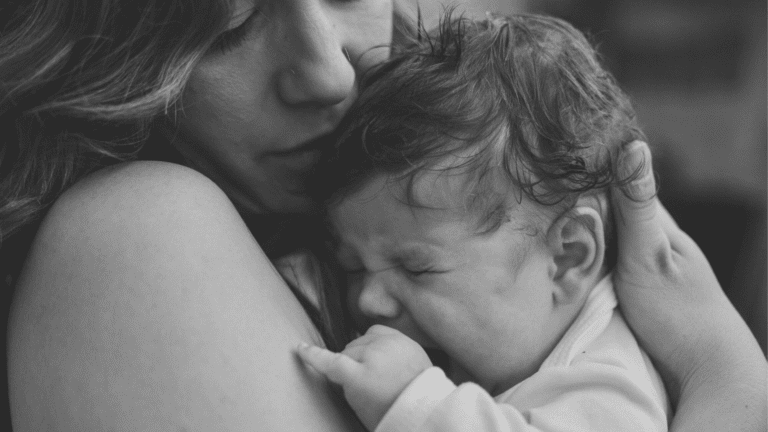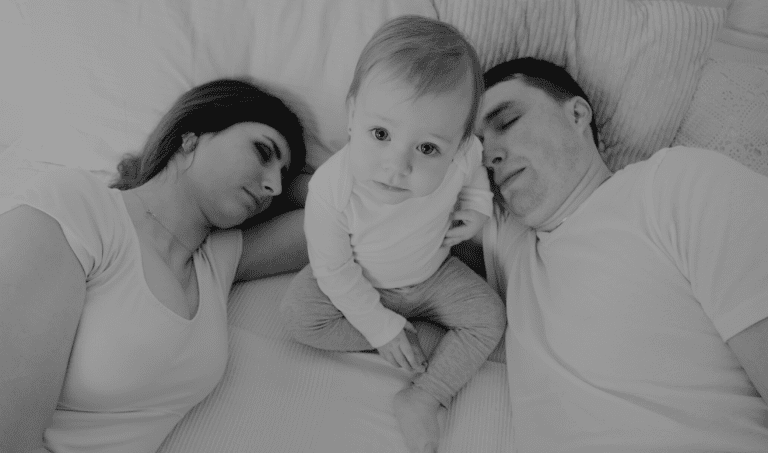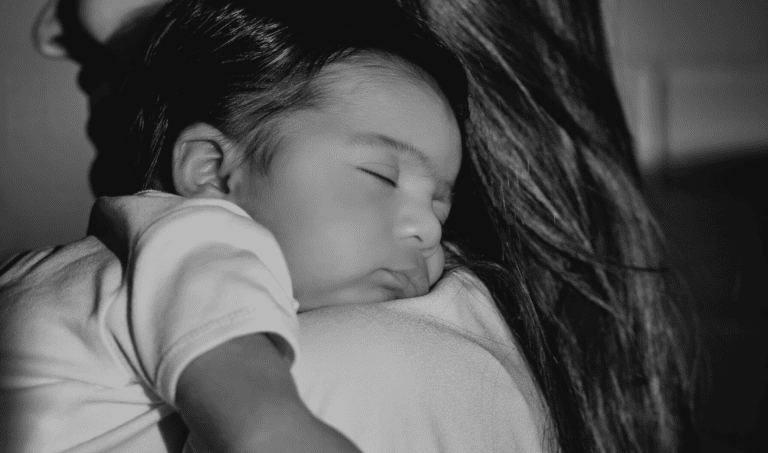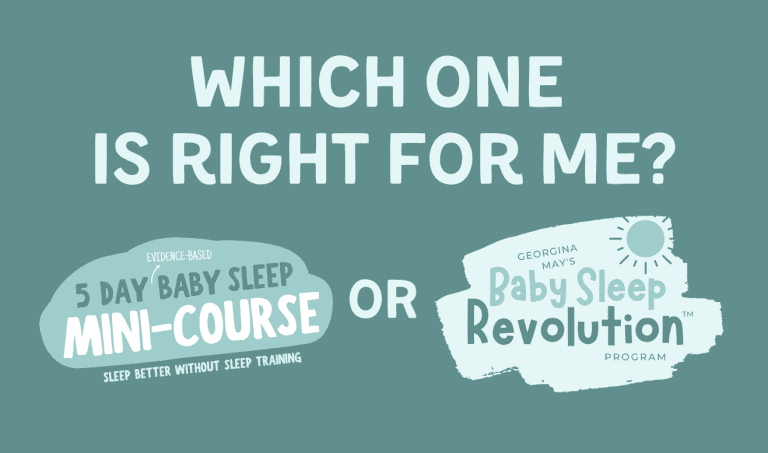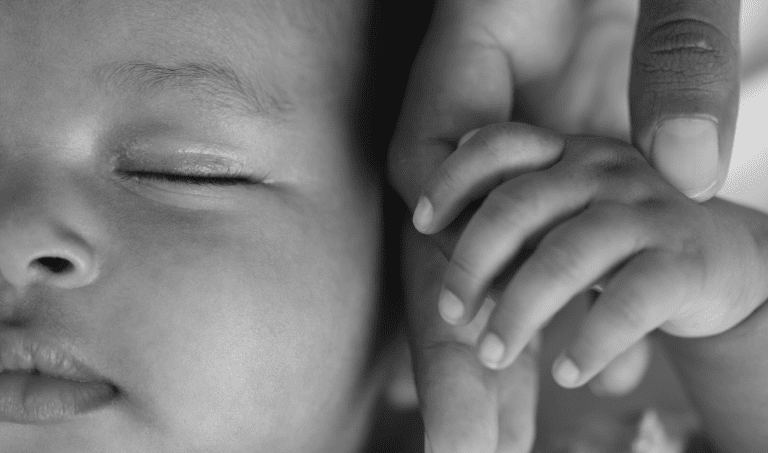I get this question a lot — in fact, a parent ask me about it again last week, and I realised I hadn’t covered it on the blog yet. It’s an important one, so let’s dive in!
Teething is often blamed for sleep disruptions in babies and toddlers. Many parents notice that their little one seems more wakeful when a new tooth is on the horizon. But what does the science actually say about this? Does teething really cause sleep problems, or are there other factors at play?
The teething-sleep connection: myth or reality?
It’s a common belief that teething causes wakefulness, and if you’re a parent who’s been up in the middle of the night with an unsettled baby, it’s easy to see why teething might get the blame, especially if there’s no other obvious reason/s. However, research to date has not found a relationship between teething and significant sleep disruption [1-5].
While some parents report noticing a pattern of increased wakefulness when their baby is teething, studies suggest that these periods of wakefulness are most likely due to other factors happening at the same time. In other words, your little one’s wakeful nights are unlikely to be caused by a new tooth cutting through, and more likely to be caused by something else.
What else could be causing the wakefulness?
If your little one is suddenly having trouble sleeping well at night or waking up more often than usual, teething might seem like an easy explanation — but it’s important not to assume that’s the reason. In fact, there could be something else going on that’s affecting their sleep, and by chalking it up to teething, you might miss a more important cause.
Here are a few potential reasons your baby might be more wakeful than usual at night:
1 – Health issues or conditions
If your little one is more wakeful than usual or than they have been in the past, it’s always a good idea to check for signs of illness or pain/discomfort that may be caused by a health condition. Illnesses are very common in the first few years – research has found infants have up to 8-10 colds a year [6] …and then there’s all the other lovely bugs! Visible signs and symptoms of illnesses can often take a day or two to appear, so increased wakefulness can often be the first sign that a little one is feeling unwell.
There are also many health conditions that have been found to be associated with sleep disruption – either because they cause pain or discomfort, or because they affect systems in the body or brain. If your little one becomes really wakeful at night, and it continues for many weeks or longer without any obvious cause (e.g. a temporary illness), it’s important to investigate other possible health-related causes with your child’s healthcare professional as a next step, rather than assuming the wakefulness is just due to teething.
2 – Separation anxiety
Between 6-12 months (and beyond), many little ones go through periods of heightened separation anxiety where they have a strong need to be close to their parent or caregiver. Sometimes, if a little one is sleeping in a separate room, they can become more wakeful at night. This can happen if they can’t sense your presence when they stir in between sleep cycles – so instead of just stirring and falling into the next sleep cycle, they can fully wake up and signal. Separation anxiety is a very normal part of development. If your baby is clingy during the day or more upset than usual when you leave the room, separation anxiety could be the reason they’re waking up at night. Having them sleep in the same room as you, within arm’s reach in a cot/crib or even a travel cot/crib, or safely bed sharing (if it’s an option available to you), can help avoid wakefulness that occurs as a result of separation anxiety.
If your little one is very wakeful even when they’re room sharing or bed sharing, then separation anxiety is unlikely to be the reason for the increased wakefulness.
3 – Low sleep pressure
Sleep pressure (aka sleep-wake homeostasis) is a measure of how sleepy we feel and is one of the two systems in our body responsible for regulating sleep. It’s actually a chemical called adenosine, and it builds up in our brain while we’re awake. The more time we spend awake, the sleepier we feel. And then as we sleep, it reduces again.
To sleep soundly at night, we need to build up enough sleep pressure by bedtime. If we don’t – if we’re not tired enough – we can have trouble falling asleep, or struggle to sleep well at night, or both. Pretty logical, right? But when it comes to baby sleep, the science often gets lost in the sea of misinformation.
What a lot of parents don’t realise is that there’s a really wide variation when it comes to how much sleep babies and toddlers have. Research has found that those aged between 6 and 24 months typically have anywhere from 9 – 16 hours of sleep per 24 hours (including naps!), and those under 6 months have anywhere from 9 – 18 hours (up to 20 in the newborn period [7].
A really wide range! So some little ones need a lot of sleep, while others need only a few hours more than most adults. Most parents don’t know this though, and so encourage long naps and set early bedtimes, thinking it’s necessary. This isn’t a problem if your little one has average to high sleep needs, but if they don’t, too much sleep / not enough awake time during the day can make it hard for sleep pressure to build to a high enough level by bedtime, leading to:
- Frequent night waking (hourly/every sleep cycle)
- Split nights (like a 2am party)
- Extended periods of restlessness or light sleep
Sometimes – though not always – they can also have trouble falling asleep or wake really early.
Many little ones who experience this just have a short term blip and then return to a restful sleep pattern without much fuss within a few days to a week.
But some – especially those with low sleep needs – are more sensitive. They can get stuck in a cycle, where after a string of wakeful nights, they catch up on sleep during the day, which reduces sleep pressure, leading to more wakeful nights. Some of these little ones are wakeful every night, while others ride a ‘sleep rollercoaster’ – cycling between strings of okay/good nights (when sleep pressure reaches an adequate level), and strings of wakeful nights (when it doesn’t).
If your little one is more wakeful at night than they have been in the past, and you’ve ruled out health-related causes and separation anxiety, then low sleep pressure is the most likely culprit.
The good news? If low sleep pressure is what’s causing your little one’s wakefulness, there IS a light! It is possible to get them out of this cycle and back into a restful sleep pattern where they’re sleeping soundly, for decent stretches at night, consistently. This is what I help parents with every day in my Baby Sleep Revolution™ program. If you’re interested, visit the BSR program page to learn more about it and watch the video ‘Is BSR Right For You’ which details how it works and can help you decide if it’s a good fit for your situation.
What if it IS teething?
Of course, teething isn’t completely off the hook. While it hasn’t been found to be associated with significant sleep disruption, there’s still a possibility that tooth eruption may cause mild discomfort that could temporarily disrupt sleep, especially if your little one is particularly sensitive to pain. However, if teething is affecting sleep, the disruption is likely to be minimal and temporary — lasting only a few days while the tooth is coming through.
The bottom line? Don’t be too quick to blame teething…
While it’s easy to assume teething is the cause of your baby’s sleepless nights, the research tells us it’s most likely not the culprit, especially if the wakefulness has been going on for some time – many weeks or longer either every night, or on and off. If your little one experiences an increase in night wakefulness, it’s important to look at other factors like health issues, separation anxiety, or low sleep pressure before settling on teething as the cause. By exploring these possibilities, you can address the real reasons behind the wakefulness and help everyone in the family sleep better.

REFERENCES:
[1] Macknin, M. L., Piedmonte, M., Jacobs, J., & Skibinski, C. (2000). Symptoms associated with infant teething: a prospective study. Pediatrics, 105(4 Pt 1), 747–752. https://doi.org/10.1542/peds.105.4.747
[2] Massignan, C., Cardoso, M., Porporatti, A. L., Aydinoz, S., Canto, G.deL., Mezzomo, L. A., & Bolan, M. (2016). Signs and Symptoms of Primary Tooth Eruption: A Meta-analysis. Pediatrics, 137(3), e20153501. https://doi.org/10.1542/peds.2015-3501
[3] Owais, A., Zawaideh, F., & Bataineh, O. (2010). Challenging parents’ myths regarding their children’s teething. International Journal of Dental Hygiene, 8(1), 28–34. https://doi.org/10.1111/j.1601-5037.2009.00412.x
[4] Ramos-Jorge, J., Pordeus, I. A., Ramos-Jorge, M. L., & Paiva, S. M. (2011). Prospective longitudinal study of signs and symptoms associated with primary tooth eruption. Pediatrics, 128(3), 471–476. https://doi.org/10.1542/peds.2010-2697
[5] Wake, M., Hesketh, K., & Lucas, J. (2000). Teething and Tooth Eruption in Infants: A Cohort Study. Pediatrics (Evanston), 106(6), 1374–1379. https://doi.org/10.1542/peds.106.6.1374
[6] Colds in children. (2005). Paediatrics & child health, 10(8), 493–495. https://doi.org/10.1093/pch/10.8.493
[7] Galland, B. C., Taylor, B. J., Elder, D. E., & Herbison, P. (2012). Normal sleep patterns in infants and children: A systematic review of observational studies. Sleep Medicine Reviews, 16(3), 213–222. https://doi.org/10.1016/j.smrv.2011.06.001
Struggling with wakefulness?
Here’s how I can help…

Discover the little-known secrets to improving sleep and settling …in less than a week!
This evidence-based (& highly effective!) course is for you if:


Help your VERY wakeful little one sleep soundly, for decent stretches at night, WITHOUT sleep training.
This one-of-a-kind program may be a total game-changer for you if:




